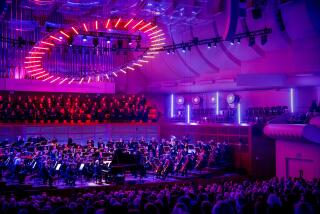Southwest Chamber Plays With Time and Space
- Share via
Southwest Chamber Music took another trip through time and space Saturday at the Norton Simon Museum Theater, as part of its “Music of the Spheres” emphasis. Messiaen’s concerns in his “Quartet for the End of Time” may be more teleological than cosmological, but the piece is a natural for this series, and artistic director Jeff von der Schmidt paired it with a contrasting--even opposing--recent work by Brian Ferneyhough.
For Messiaen, eternity is characterized by a serenity and joy that is remarkable considering that he wrote this in 1940 while a Nazi prisoner of war. Here, time dances over itself in the composer’s famous rhythmic palindromes or floats in a persistent present tense, unencumbered by antecedent or consequence.
Clarinetist Jim Foschia, violinist Mark Menzies, cellist Paula Fehrenbach and pianist Gayle Blankenburg did particularly well by the timeless aspects, the tranquil spirals of unaffected melody. Their ensemble sound was a little lean, but their balances were sure and their phrasing sensitive to each other and the composer’s intentions.
Ferneyhough’s 1994 “On Stellar Magnitudes” is an essay of complicated textures and unpredictable gestures, a sort of mechanistic caprice on his own Joycean nonsense text. Soprano Kathleen Roland sang it with crisp, sober conviction, and Von der Schmidt conducted the small ensemble with full regard for the multifarious energy and color of the piece.
To open there were two of Peter Maxwell Davies’ reworkings of Renaissance motets, the simply arranged “Si Quis Diligit Me” and the gradually splintered “All Sons of Adam.” The mild, slightly vague performances led by Von der Schmidt left them sounding desultory and dull.
More to Read
The biggest entertainment stories
Get our big stories about Hollywood, film, television, music, arts, culture and more right in your inbox as soon as they publish.
You may occasionally receive promotional content from the Los Angeles Times.










